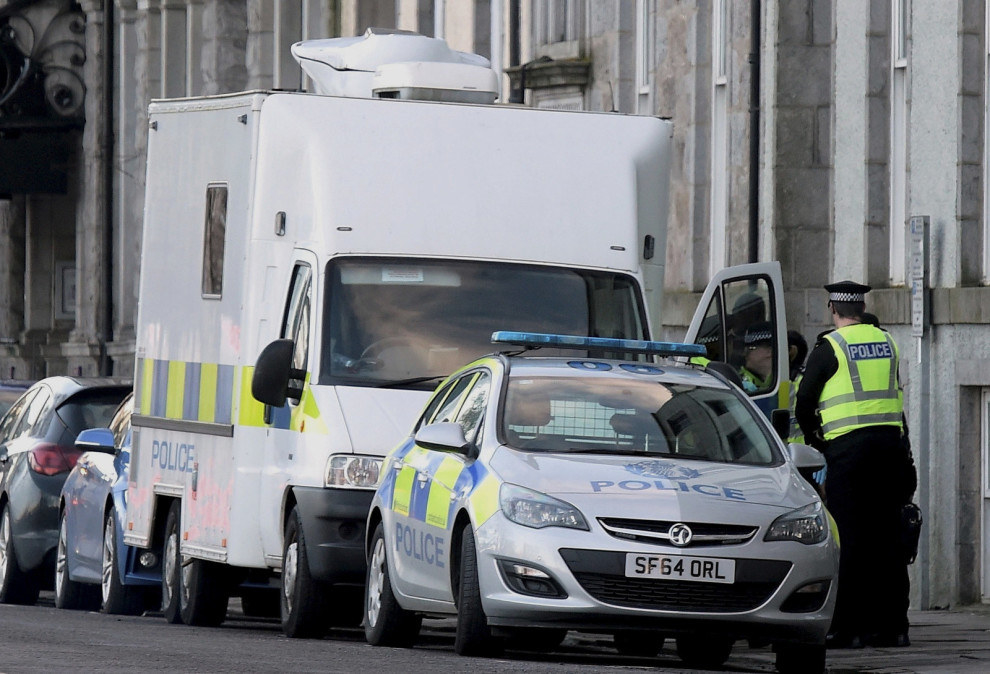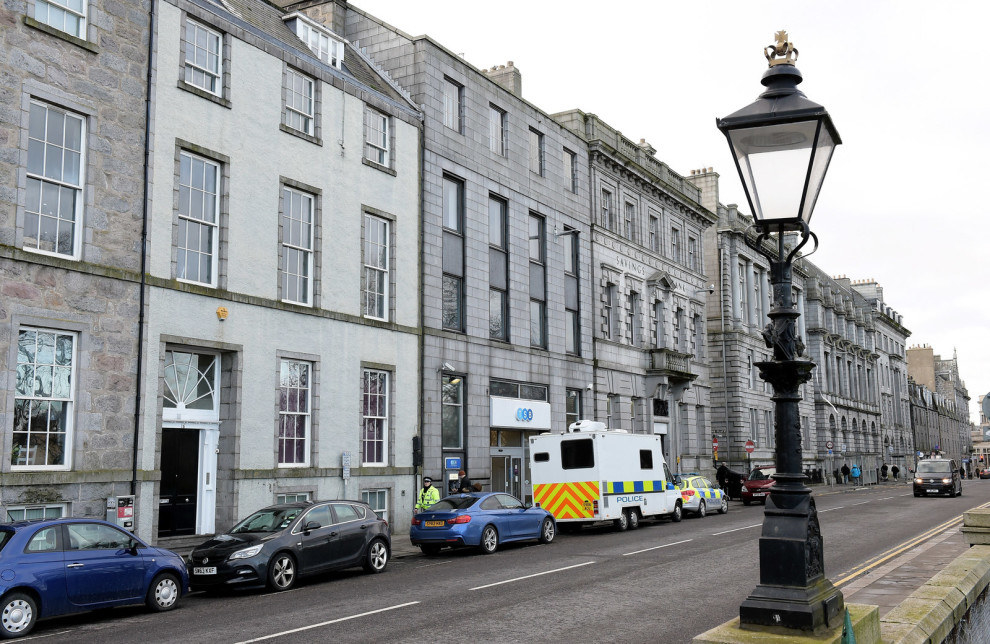
On 11 February 2016, sex worker Jessica McGraa made a phone call to her friend. Something was wrong. Her client wouldn’t leave, he hadn’t paid her. The friend was worried but unsure what to do. McGraa made a second phone call, to her boyfriend. The people she didn’t call were the police.
McGraa, a 37-year-old mother from London, was in Aberdeen for work. She’d been to this city before and was in a rented apartment. Today, things were spiralling out of control.
Soon after making the phone calls, McGraa was killed – strangled to death by the client she’d been worried about. Her body was found by police the following day. Last week Bala Chinda, 26, was convicted of her rape and murder and has been jailed for life, with a minimum term of 18 years.
McGraa’s death sent waves of horror through the sex work community across the UK. As an independent worker, advertising online, she was part of one of the fastest-growing sectors of the industry. Her story was close to home for thousands of people working in similar circumstances. How many of them would have called the police?
Giving evidence at the trial, McGraa’s friend, also a sex worker, described turning up at the Aberdeen apartment to find it surrounded by police vans, and the sickening dread of realising what had happened. Another thought was running through her mind: to be wary about telling the officers her occupation. Her relationship with the police was not one of trust.

Tanya*, a Scottish escort, was working in Aberdeen when McGraa was killed. “I was freaked out,” she told BuzzFeed News. “Somebody sent me a text asking me if I was OK and that’s when I heard what happened. It was so scary.”
Tanya says she wouldn’t call the police if she felt in danger, unless a physical attack had already taken place. “If it was nonviolent I wouldn’t call. I wouldn’t want to be on record as working girl. It would have to be a dangerous situation but not if it was just a robbery or something.”
With the trial over, McGraa’s death has prompted many to ask how we have created a climate in which sex workers call anyone but the police. A climate in which they end up dead. It’s worth looking more closely at the situation in Aberdeen.
“Her death should never have happened.”
In 2013, the formation of Police Scotland – a merging of eight regional forces – heralded a crackdown on the sex industry in all its forms. Spearheaded by then Chief Constable Sir Stephen House, police raided saunas, brothels, and strip clubs across Scotland and many were shut down.
Like the rest of the UK, Scottish law around prostitution is piecemeal. While it’s legal to sell sex, many activities relating to this are illegal — most importantly, soliciting and brothel-keeping. Enforcement of these laws varies from city to city.
The National Police Chiefs' Council has clear guidelines on this, warning that enforcing brothel-keeping law is counterproductive and dangerous. But its guidance doesn’t apply in Scotland, where campaigners say a similar approach is long overdue.

Police Scotland says its aim is to identify exploitation. “Our policy on prostitution is to target individuals who are controlling, abusing, or exploiting,” Detective Chief Inspector Stuart Houston told BuzzFeed News. “The main focus for us is looking to see if there’s that element of force or coercion.”
However, the scope of brothel-keeping legislation is wide. To be landed with this charge, it’s enough “to keep, manage or assist in the management of a brothel and to knowingly allow premises to be used as a brothel”. Exploitation of one person by another need not come into it.
In reality, those prosecuted under this legislation are frequently women working in a flat together, an arrangement that can be practical and, more importantly, is much safer than working alone.
Recorded brothel-keeping offences in Scotland are increasing. From 2005–2006 there were 11, in 2012–2013 there were 28, in 2014–2015 there were 36.
“If it was nonviolent I wouldn’t call. I wouldn’t want to be on record as working girl.”
Raids are usually carried out in the name of rescuing trafficking victims. This was the justification given in 2014 when large teams of officers, accompanied by the Border Agency, stormed strip clubs across Scotland. Three clubs in Aberdeen were targeted, the dancers questioned and fingerprinted, but no trafficking victims found.
Last year, two Romanian women working in Aberdeen went on trial accused of running a brothel. During the raid when they were arrested, police repeatedly asked the women if they’d been forced into sex work or trafficked. After insisting the contrary, the women showed officers their personal websites, not knowing this would be used as evidence against them. When it emerged that police hadn’t told the women they might be prosecuted for brothel-keeping, or read them their rights, the Crown threw out the case.
In Scotland, the legal names and details of sex workers are frequently shared in the press. Between 2013 and 2017, in Aberdeen alone, at least 16 women have been identified, in national papers, as “brothel keepers”.
Victim Support Scotland told BuzzFeed News it is concerned that, during McGraa’s trial, both sex workers who gave evidence were named, and one of them photographed, by the press. “People who are called to give evidence are entitled to privacy,” director of operations Alan McCloskey said. “They’re providing a public duty in coming forward and the press have a responsibility to behave responsibly. Breaching of that is a concern.”
For women working in what is probably the world’s most stigmatised occupation, this type of public humiliation by the media is something to fear. Lives are turned upside down with a salacious headline and a throwaway story. The role of the press is significant in creating a climate of fear.

Katya* is a Scottish escort who visits Aberdeen regularly for work. She told BuzzFeed News that instead of touring with a friend, as she used to, she now goes on her own. The risks of being arrested are just too high. Late one night, at the end of last year, working alone in a serviced apartment, Katya was frightened when someone stood outside ringing the buzzer for nearly an hour. “I might have phoned the police in Edinburgh, I might in England, but I would never in Aberdeen,” she said.
National Ugly Mugs, an NGO that provides alerts about dangerous clients to 15,000 sex workers across the UK, has condemned the current legal framework in which women feel compelled to work on their own and in which few would feel safe calling the police. Its chief executive, Alex Feis-Bryce, told BuzzFeed News: "Police forces can essentially pick and choose what they enforce. This creates a patchwork approach with policing often based not on public protection but driven by reactionary local politics, hysterical media coverage, and loud, angry residents concerned about their property prices.”
Sex worker rights organisation Scot-Pep is calling on the Scottish government to make legislative changes. “That Jessica feared the consequences of contacting the police, even when in fear for her life, makes clear how profound the impact of this police enforcement was on sex workers and their safety,” the organisation said in a statement. “It is long past the time for the Scottish government to gather their courage and change the law to make it possible for small groups of sex workers to share a flat for their own safety, without risking arrest.”

An attempt to repeal laws that criminalise sex work – soliciting, kerb-crawling, brothel-keeping, and sharing bills with a sex worker – from MSP Jean Urquhart in 2015 was unsuccessful, but organisations like Scot-Pep are pushing for decriminalisation and the Scottish government hasn't ruled out legislative change.
A spokesperson for the Scottish government told BuzzFeed News: “The Scottish government commissioned research in 2015 to consider the reliability of the evidence base on prostitution internationally and understand its relevance to circumstances in Scotland. We will publish shortly the research to allow external stakeholders the opportunity to comment on the findings and will fully consider the outcomes of this research, its feedback, and any further views of stakeholders before making any future policy decisions around prostitution in Scotland.”
“It is long past time for the government to gather their courage and change the law.”
For now though, the view informing police enforcement in Scotland – that sex work is intrinsically dangerous – is echoed by the government line, which focuses on the dangers of exploitation rather than the safety of individual workers at risk from clients.
“We will continue to support measures that can help to reduce the harm caused by prostitution and encourage the enforcement of existing laws against those who seek to exploit others through prostitution,” the government spokesperson said.
It’s a viewpoint that was reinforced in the closing remarks of Chinda’s trial. Asking for his client to be acquitted, defence advocate Ian Duguid told the jury McGraa’s lifestyle was risky. “In her life,” he said, “she would always be in danger of someone doing something wrong to her.”
For sex workers, such acquiescence isn’t possible. “There was, and still is, a lot of anger that Jessica didn't feel she could reliably contact the police and also that she wasn’t permitted by law to work with another sex worker for safety,” sex worker and activist Laura Lee told BuzzFeed News. “Her death should never have happened and could have been avoided with the repeal of archaic laws which fly in the face of international evidence for decriminalisation.”
Houston from Police Scotland says sex workers should call the police if they’re in trouble. “People should be able to report a crime, irrespective of what their position is,” he said. “Individuals involved in prostitution have a right to the protection of the law, the same as anyone else.”
But sex workers say he’s missing the point. “I don’t think they understand why Jessica couldn’t phone them,” Katya explained. “Her death was horrible, really upsetting, and everyone was shocked but, at the same time, not shocked. It was on the cards, with the way police treat sex workers.”
*Sex workers’ names have been changed.
